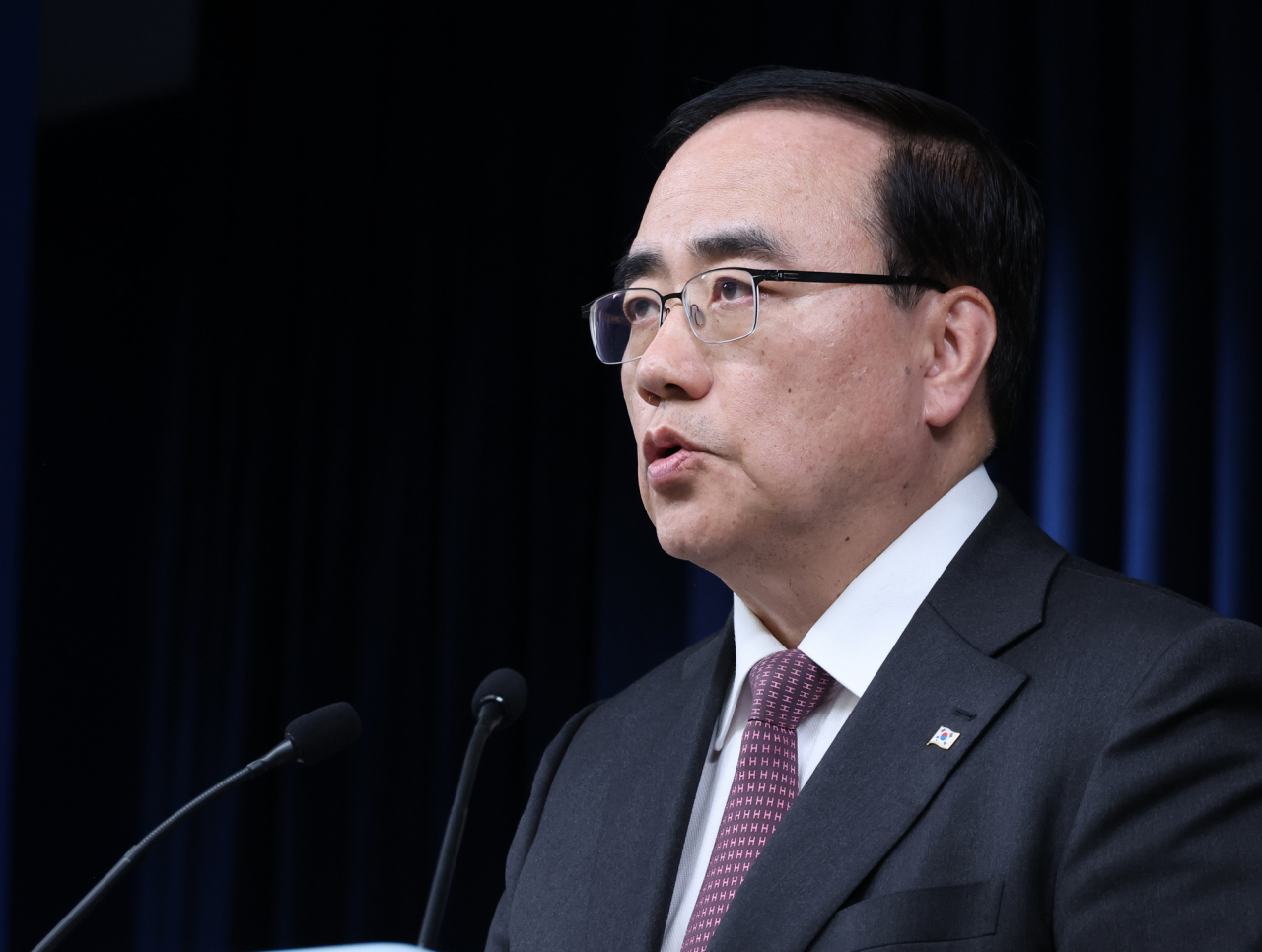Seoul sees Yoon’s Tokyo visit as 'milestone' in improving relations
National Security Adviser says the visit is an opportunity to break vicious cycle, restructure bilateral relations
By Shin Ji-hyePublished : March 14, 2023 - 17:57

President Yoon Suk Yeol’s upcoming visit to Japan is a significant step in improving Korea-Japan relations, providing an opportunity to break the long-standing vicious cycle of stagnation and move toward normalization, the nation’s national security adviser said on Tuesday.
At the invitation of the Japanese government, Yoon, accompanied by first lady Kim Keon Hee, will embark on a working trip to the neighboring country from March 16-17. This marks the first time in 12 years that a Korean president will attend a bilateral summit in Japan since the meeting between former President Lee Myung-bak and former Prime Minister Yoshihiko Noda in December 2011.
During a press briefing at the presidential building in Yongsan, national security adviser Kim Sung-han stated that "this visit is significant in declaring that Korea-Japan relations, which have been strained so far, are now seriously moving toward normalization."
“The relationship between South Korea and Japan has been stuck in a vicious cycle of stagnation due to the prolonged strain in their relations, making it difficult for their leaders to meet easily,” he said.
“Yoon’s visit to Japan presents a crucial opportunity to break this vicious cycle and restructure the conditions for full-scale exchanges between the two countries.”
Kim said the two leaders will discuss ways to normalize the overall Korea-Japan relations, which includes the implementation of the solution reached on the issue of forced labor rulings.
Last week, Seoul controversially agreed to compensate former forced laborers, who worked in Japanese factories during World War II, through a public foundation funded by Korean firms, in an effort to put an end to the long-standing feud with Japan.
According to Kim, the two leaders will also discuss ways to “resolve policy barriers that hinder economic cooperation and deepen competitiveness” between the two countries.
On the first day of the visit, Yoon will have a luncheon meeting with Korean compatriots, followed by a summit and dinner with Japanese Prime Minister Fumio Kishida.
During the summit, the two leaders are expected to discuss Japan's export restrictions on chip materials, parts and equipment, as well as Japan's removal of South Korea from its whitelist. They are also expected to discuss Korea's response, which includes filing a complaint against Japan to the World Trade Organization.
In 2019, Japan removed South Korea from its list of favored trade partners in retaliation for Korean Supreme Court rulings against Japanese firms.
“The issues are under discussion between the two authorities,” a senior official from the presidential office said on the condition of anonymity.
“As the export restrictions, whitelist exclusion and WTO complaints are interconnected, if the negotiations move forward, all three issues will be resolved together although there could be a time lag.”
Kim expects that through the summit and dinner, the two leaders will deepen mutual personal trust and pledge their will to recover relations between the two countries.
"The relationship of personal trust between the leaders is a very important asset in diplomacy," he said.
“The trust-building between President Yoon and Prime Minister Kishida will have a positive impact on friendship and exchanges between the peoples of the two countries in the future.”
On the second day of his visit, President Yoon will meet with members from the Japan–Korea Parliamentarians' Union, which promotes exchanges and friendship between the two countries, and the Korea-Japan Cooperation Committee, which is in charge of private exchanges. The meeting will be attended by former Prime Ministers Taro Aso and Yoshihide Suga.
President Yoon also plans to support economic exchanges between the two countries by attending a Korea-Japan business roundtable luncheon with key business leaders from both countries.
Samsung Electronics Chairman Lee Jae-yong, SK Group Chairman Chey Tae-won, Hyundai Motor Group Chairman Chung Euisun, LG Group Chairman Koo Kwang-mo and other business leaders will visit Japan en masse during Yoon’s visit.
The business people of the two countries are expected to discuss the tentatively called “future youth fund,” which was created by South Korean and Japanese companies in relation to the compensation for victims of forced labor.
In the late afternoon, Yoon will return to Korea after giving a lecture at Keio University for Japanese and Korean students.
Choi Eun-mi, research fellow at the Asan Institute for Policy Studies, said the summit is particularly important as it is held after South Korea announced its solution to the long-standing forced labor issues.
At this summit, the direction and will of future cooperation between Korea and Japan should be presented to connect the past and the future beyond the meaning of resolving pending issues, she said.
“Japan should show regret and remorse for the past with a humble heart and Korea should respect Japan as a cooperative partner and give it trust to move forward together,” Choi said.
“Both countries should be able to go through a process of remembrance, healing and reconciliation at a new crossroads moving from the past to the future,” the researcher said.
“And these matters should be presented as a result of the summit, such as a message or a joint statement from the leaders of the two countries.”











![[Today’s K-pop] BTS pop-up event to come to Seoul](http://res.heraldm.com/phpwas/restmb_idxmake.php?idx=644&simg=/content/image/2024/04/17/20240417050734_0.jpg&u=)
![[Graphic News] More Koreans say they plan long-distance trips this year](http://res.heraldm.com/phpwas/restmb_idxmake.php?idx=644&simg=/content/image/2024/04/17/20240417050828_0.gif&u=)





![[KH Explains] Hyundai's full hybrid edge to pay off amid slow transition to pure EVs](http://res.heraldm.com/phpwas/restmb_idxmake.php?idx=652&simg=/content/image/2024/04/18/20240418050645_0.jpg&u=20240419100350)

